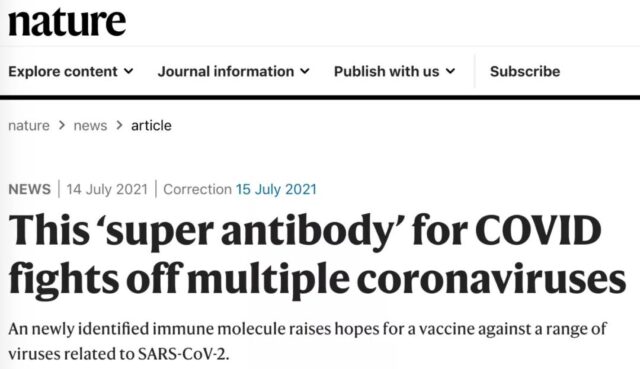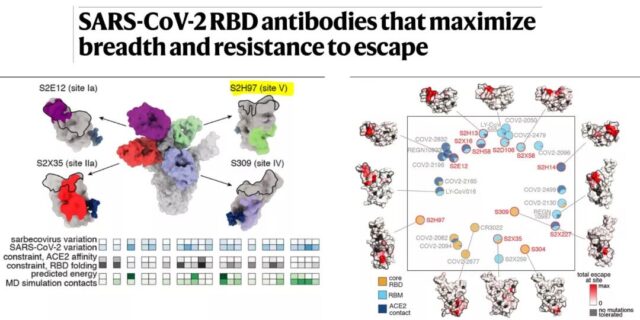“Super antibodies” can fight against all COVID-19 virus including variants!
- Normal Liver Cells Found to Promote Cancer Metastasis to the Liver
- Nearly 80% Complete Remission: Breakthrough in ADC Anti-Tumor Treatment
- Vaccination Against Common Diseases May Prevent Dementia!
- New Alzheimer’s Disease (AD) Diagnosis and Staging Criteria
- Breakthrough in Alzheimer’s Disease: New Nasal Spray Halts Cognitive Decline by Targeting Toxic Protein
- Can the Tap Water at the Paris Olympics be Drunk Directly?
Science: “Super antibodies” can fight against all COVID-19 virus including variants!
“Super antibodies” can fight against all COVID-19 virus including variants! According to a report on the “Nature” website, the research team of the Fred Hutchinson Cancer Research Center in Seattle, USA published the latest research results in the international journal Nature on the 14th.

Vir Biotechnology has isolated 12 strains of antibodies from COVID-19 patients and SARS patients to detect the ability of these antibodies to entangle viral gene fragments. The purpose of this research is to solve the current dilemma of the medical community in the treatment of COVID-19: some variant viruses carry Mutations can escape antibody therapy.
At this stage, many antibody therapies are mainly to entangle antibodies with viral protein fragments that bind to human cell receptors. This protein fragment is also called the receptor-binding domain (RBD).
The researchers compiled a list with thousands of mutations in the receptor binding region of several variants of the new coronavirus, as well as mutations in the receptor binding region of the coronavirus, which is similar to the new coronavirus, called “sarbecovirus”. “Sarbecovirus” includes the “Severe Acute Respiratory Syndrome” (SARS) virus and the new coronavirus. The researchers then assessed how these mutations affect the ability of the 12 antibodies to bind.
The results showed that an antibody called “S2H97” stood out. It can bind to the receptor binding region of all “sarbecovirus” coronaviruses, and can prevent a series of variants of new coronaviruses and other “sarbecoviruses” from spreading between cells. In addition, ” “S2H97” can also prevent hamsters from contracting COVID-19 pneumonia. Therefore, researchers call “S2H97” the “pan-sarbecovirus antibody” and describe it as the “coolest antibody”.
A closer examination of the molecular structure of the “S2H97” antibody reveals that it mainly attacks a previously undiscovered area on the virus receptor binding area. This protein fragment will only appear when the receptor binding area binds to the human cell receptor.

Research author Tyler Starr, a biochemist at the He Qinsen Cancer Research Center, said that antibodies targeting this receptor binding region can protect against several viruses, and may even be used to make related vaccines in the future.
According to Arinjay Banerjee, a virologist at the University of Saskatchewan in Canada, the good news is that humans have identified antibodies that bind to a series of “sarbecovirus”, but the biggest problem at the moment is: “Those have already What about viruses that exist but we still don’t know?” He said that although scientists cannot test for unknown viruses, related therapies and vaccines will help the world fight the next wave of coronavirus epidemics.
“Super antibodies” against COVID can fight against multiple coronaviruses
Antibodies (light blue; artist’s impression) swarmed around SARS-CoV-2 particles. Image source: Design Unit/SPL
Scientists have discovered an antibody that can resist not only a wide range of SARS-CoV-2 variants, but also the closely related coronavirus1. This discovery may help develop a wide range of treatments and vaccines.
Tyler Starr, a biochemist at the Fred Hutchinson Cancer Research Center in Seattle, Washington, and his co-authors set out to clarify a problem facing COVID-19 antibody therapy: some variants of SARS-CoV-2 have acquired mutations that allow the virus to escape antibody control.
The researchers examined 12 antibodies that Vir Biotechnology, a company involved in the study, isolated from people infected with SARS-CoV-2 or its close relative SARS-CoV. These antibodies lock onto viral protein fragments that bind to human cell receptors. Many antibody therapies for SARS-CoV-2 infection use the same protein fragments called receptor binding domains.
The researchers compiled a list of thousands of mutations in the binding domain of multiple SARS-CoV-2 variants. They also catalogued mutations in the binding domain of dozens of SARS-CoV-2-like coronaviruses, which belong to a group called sarbecoviruses. Finally, they assessed how all these mutations affect the ability of 12 antibodies to adhere to the binding domain.
Further examination of the molecular structure of S2H97 showed that it was targeting a previously invisible and well-hidden area of the binding domain—this part was only shown when the domain popped up to bind to the cell receptor. Starr pointed out that molecules targeting this binding domain region can provide protection against a variety of viruses, and may one day be used in Pansabeko virus vaccines. An antibody, S2H97, stands out for its ability to adhere to the binding domain of all sarbecovirus tested by the researchers. S2H97 is called a pan-sarbecovirus antibody by the author, which prevents a series of SARS-CoV-2 variants and other sarbecoviruses from spreading in cells grown in the laboratory. It is also strong enough to protect hamsters from SARS-CoV-2 infection. “This is the coolest antibody we have ever described,” Starr said.
The other 11 antibodies can target multiple viruses, but the better the antibody prevents the earliest known SARS-CoV-2 strain from entering the cell, the smaller the range of viruses it can bind. The team also discovered that antibodies that can disable multiple viruses target parts of the binding domain that tend not to change as the virus evolves.
Arinjay Banerjee, a virologist at the University of Saskatchewan in Saskatoon, Canada, said the good news is that the team has identified antibodies that can bind to a series of sarbecovirus. “The biggest question left is, we don’t know the virus exists yet?”
Banerjee added that although scientists cannot test the activity of antibodies against unknown viruses, pan-sarbecovirus treatments and vaccines will help the world prepare for the next coronavirus that spreads from wild animals to humans.
(source:internet, reference only)
Disclaimer of medicaltrend.org
Important Note: The information provided is for informational purposes only and should not be considered as medical advice.



